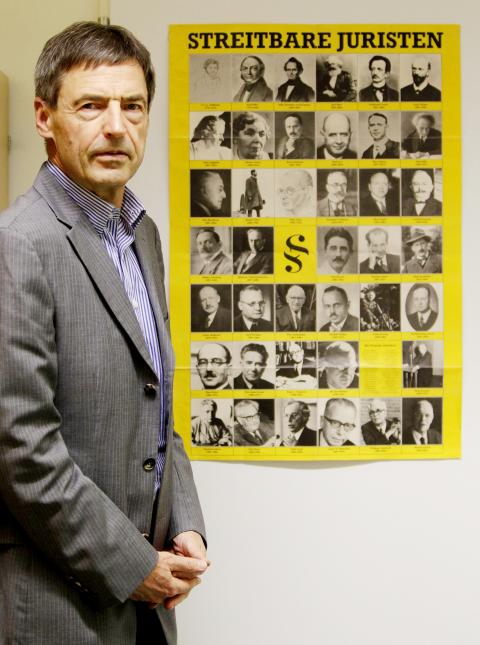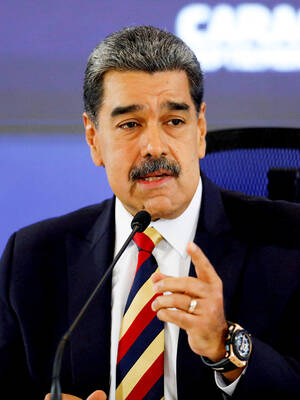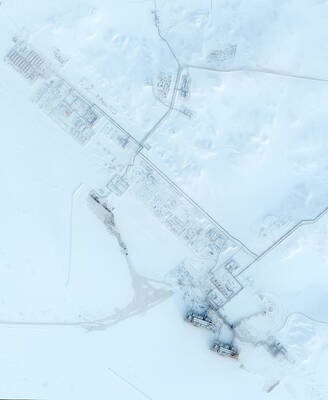Percy MacLean can call on 250 years of experience to weigh up how immigrants integrate in Germany. Since his Scottish ancestor arrived in 1753, the family has produced mayors, members of parliament and even a Nazi.
Today, the 63-year-old MacLean, a chief judge in Berlin’s administrative court, says Germany risks losing the openness that allowed his family to flourish for generations because of a divisive national debate over the integration of Muslims.
MacLean said tendentious arguments now being aired publicly contained the seeds of what could spawn the kind of right-wing populism and xenophobia Germany witnessed in the run-up to the Holocaust.

Photo: Reuters
Muslims have been in the media spotlight since central banker Thilo Sarrazin stirred up a row this autumn by asserting that Turkish and Arab families were dumbing down Germany, swamping it with a higher birth rate and threatening the indigenous culture.
“Things can get very explosive once you start mentioning genes and intelligence,” MacLean said. “Talking down to them is totally wrong. We are the ones who invited them over here.”
“Sarrazin has opened fire on these people in a way that marginalizes them, fuels prejudice, and worst of all, gets into genetics which creates people of first, second and third class.”
Sarrazin later lost his job at the Bundesbank, but the book he wrote at the center of the row, Deutschland schafft sich ab (Germany does away with itself), became a record-breaking bestseller.
“That just goes to show how dangerous the subject has already become,” said MacLean, who served as the inaugural director of the German Institute for Human Rights in 2002 to 2003.
Sarrazin, who like MacLean belongs to the center-left Social Democrats (SPD), was instantly hailed by far-right groups like the National Democratic Party (NPD) as a bold breaker of taboos.
Although condemned by the main parties and religious lobbies, Sarrazin also won supporters in respected media outlets who argue his most provocative statements foster debate and do not cloud the public’s perception of Muslims in Germany.
“The line of argument you only used to get with the NPD has suddenly acquired a larger breeding ground,” MacLean said. “I hope we can turn this into something positive. Otherwise we might end up with something like we saw in the Third Reich.”
Long dedicated to the cause of refugees, MacLean oversaw research into the fate the Nazis meted out to Jewish members of the Club of Berlin, a top gentlemen’s club in Imperial Germany that his forebear Lauchlan was founding chairman of in 1864.
“My ancestor was an unaccompanied minor when he was sent out to make his way in a foreign land. Perhaps it’s because we were strangers in Germany and were granted good opportunities here that I felt refugees should have the same chance,” he said.
According to academic research, tens of thousands of Scots left their homeland to settle in modern Germany, Poland and the Baltic region in the centuries after the Reformation.
At the age of 16, MacLean’s ancestor, Archibald, left the Hebridean island of Coll for Danzig (now Gdansk in Poland) during the crackdown on Highland clans that followed the failure of Bonnie Prince Charlie’s Jacobite Rebellion in 1745-1746.
Archibald’s grandson Richard later became mayor of the Prussian port of Memel — now Klaipeda in Lithuania — and three MacLeans went on to sit in Prussia’s state parliament.
The family continued to thrive after Germany united in 1871, all the while maintaining its ties with Scotland. Percy’s uncle Curt Hugo MacLean served as a major in the Wehrmacht in World War II, while another, Donald, joined the Nazi party.
“All my forebears went back to Scotland to keep up with things,” MacLean said, who first went at 16. “Obviously I don’t have citizenship but I’m still very attached to the country.”

VENEZUELAN ACTION: Marco Rubio said that previous US interdiction efforts have not stemmed the flow of illicit drugs into the US and that ‘blowing them up’ would US President Donald Trump on Wednesday justified a lethal military strike that his administration said was carried out a day earlier against a Venezuelan gang as a necessary effort by the US to send a message to Latin American cartels. Asked why the military did not instead interdict the vessel and capture those on board, Trump said that the operation would cause drug smugglers to think twice about trying to move drugs into the US. “There was massive amounts of drugs coming into our country to kill a lot of people and everybody fully understands that,” Trump said while hosting Polish President

Japan yesterday heralded the coming-of-age of Japanese Prince Hisahito with an elaborate ceremony at the Imperial Palace, where a succession crisis is brewing. The nephew of Japanese Emperor Naruhito, Hisahito received a black silk-and-lacquer crown at the ceremony, which marks the beginning of his royal adult life. “Thank you very much for bestowing the crown today at the coming-of-age ceremony,” Hisahito said. “I will fulfill my duties, being aware of my responsibilities as an adult member of the imperial family.” Although the emperor has a daughter — Princess Aiko — the 23-year-old has been sidelined by the royal family’s male-only

A French couple kept Louise, a playful black panther, in an apartment in northern France, triggering panic when she was spotted roaming nearby rooftops. The pair were were handed suspended jail sentences on Thursday for illegally keeping a wild animal, despite protesting that they saw Louise as their baby. The ruling follows a September 2019 incident when the months-old feline was seen roaming a rooftop in Armentieres after slipping out of the couple’s window. Authorities captured the panther by sedating her with anesthetic darts after she entered a home. No injuries were reported during the animal’s time on the loose. The court in the

Another tanker carrying liquefied natural gas from Russia’s sanctioned Arctic LNG (liquefied natural gas) 2 project has docked in a Chinese port, ship-tracking data showed, days after Russian President Vladimir Putin met Chinese President Xi Jinping (習近平) in Beijing. The London Stock Exchange Group (LSEG) tracking data indicated the Russian Voskhod LNG tanker was anchored at an LNG terminal in the port of Tieshan in Guangxi, China. The Russian flagged tanker, with a cargo of 150,000 cubic meters of LNG, was loaded up at the Arctic LNG 2 facility in Gydan in northern Siberia on July 19, LSEG data showed.